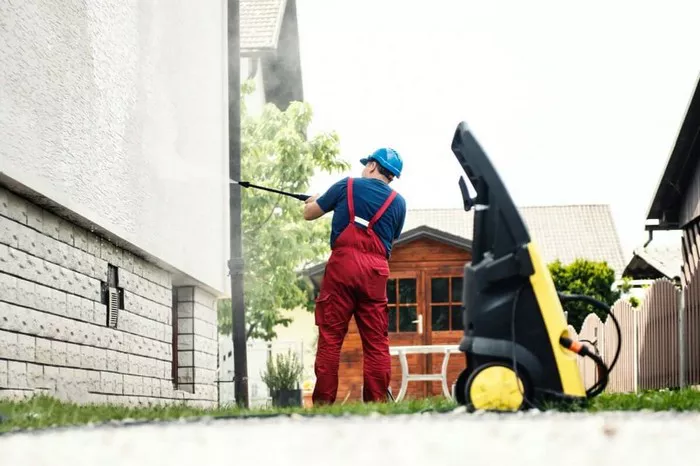Electric pressure washers are ingenious machines that harness the power of electricity to generate high-pressure water streams, effectively blasting away dirt, grime, and debris from various surfaces. Understanding how these machines work, the factors contributing to their overheating, safety features, preventive measures, signs of overheating, consequences, maintenance tips, and recommendations for use is essential for ensuring their optimal performance and longevity.
Explanation of How Electric Pressure Washers Work
At the heart of an electric pressure washer lies an electric motor and a water pump. The electric motor powers the water pump, which draws water from a connected water source and pressurizes it. This pressurized water is then expelled through a nozzle at high velocity, providing the cleaning force necessary for various applications, from washing cars to cleaning driveways and siding.
The electric motor converts electrical energy into mechanical energy, driving the pump to pressurize the water. The pressure generated is measured in pounds per square inch (PSI) and determines the cleaning power of the pressure washer. Additionally, the flow rate, measured in gallons per minute (GPM), determines how much water the machine can deliver per minute. Together, PSI and GPM define the overall performance of the pressure washer.
Potential Causes of Overheating
Despite their efficiency, electric pressure washers are susceptible to overheating under certain conditions. Common causes of overheating include:
1. Ambient Temperature: Operating the pressure washer in high ambient temperatures can strain the motor and pump, leading to overheating.
2. Extended Use: Continuous operation without allowing the machine to cool down can cause overheating.
3. Improper Use: Using the pressure washer beyond its recommended duty cycle or with incorrect nozzles can increase the workload on the motor and pump, resulting in overheating.
4. Lack of Maintenance: Neglecting regular maintenance, such as cleaning filters or checking for clogs, can impede water flow and strain the components, leading to overheating.
Safety Features
Electric pressure washers are equipped with built-in safety features designed to prevent overheating and protect the machine from damage. These features may include:
1. Thermal Overload Protectors: These devices monitor the temperature of the motor and automatically shut off power if it exceeds a safe threshold, preventing overheating.
2. Automatic Switches: Some models are equipped with automatic switches that shut off the motor if water flow is interrupted, preventing damage due to dry running.
Preventive Measures
To avoid overheating and maximize the lifespan of your electric pressure washer, consider the following preventive measures:
1. Operate in Cooler Conditions: Whenever possible, use the pressure washer in cooler ambient temperatures to reduce the risk of overheating.
2. Take Breaks During Use: Allow the machine to rest periodically, especially during prolonged use, to prevent overheating.
3. Ensure Continuous Water Flow: Always ensure a steady supply of water to the pressure washer to prevent the motor and pump from running dry.
4. Regularly Clean Filters: Clean or replace filters as recommended by the manufacturer to maintain optimal water flow and prevent strain on the components.
Signs of Overheating
Recognizing the signs of overheating is crucial for preventing damage to your electric pressure washer. Warning signs may include:
1. Reduced Power: A decrease in cleaning performance or pressure output may indicate overheating.
2. Unusual Noises: Grinding or squealing noises coming from the motor or pump could signal overheating or mechanical issues.
3. Burning Smell: A burning or hot smell emanating from the pressure washer may indicate overheating of internal components.
Consequences of Overheating
Failure to address overheating can result in various consequences, including:
1. Damage to Internal Components: Overheating can cause damage to the motor, pump, and other critical components, leading to costly repairs or replacement.
2. Shortened Lifespan: Continuous overheating can significantly shorten the lifespan of the pressure washer, reducing its efficiency and reliability over time.
Maintenance Tips
Regular maintenance is key to preventing overheating and ensuring the longevity of your electric pressure washer. Here are some maintenance tips to follow:
1. Clean Filters: Regularly inspect and clean or replace filters to maintain proper water flow and prevent clogs.
2. Check for Leaks: Inspect hoses, connections, and fittings for leaks or damage, and repair or replace as needed to prevent water loss and overheating.
3. Inspect Nozzles: Check the condition of spray nozzles for clogs or damage, and clean or replace as necessary to maintain optimal performance.
4. Store Properly: Store the pressure washer in a dry, protected area away from extreme temperatures when not in use to prevent damage and corrosion.
Comparison with Gas Pressure Washers
While electric pressure washers offer numerous advantages, such as ease of use and lower noise levels, they differ from gas models in their approach to managing heat. Gas pressure washers typically employ thermal release valves that automatically release excess pressure to prevent overheating. However, electric models rely on thermal overload protectors and automatic switches to achieve the same purpose.
Recommendations for Use
To ensure safe and efficient operation of your electric pressure washer, follow these recommendations:
1. Adhere to Duty Cycles: Follow the manufacturer’s recommendations for duty cycles, allowing the machine to rest between extended periods of use to prevent overheating.
2. Do Not Run Without Water: Never operate the pressure washer without a continuous water supply, as this can lead to dry running and overheating of the pump.
Conclusion
In conclusion, electric pressure washers are valuable tools for cleaning a wide range of surfaces, but they require proper care and maintenance to prevent overheating and ensure optimal performance. By understanding how these machines work, recognizing potential causes of overheating, implementing preventive measures, and adhering to recommended maintenance practices, users can prolong the lifespan of their electric pressure washers and avoid costly repairs.

